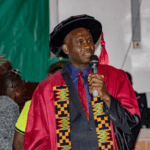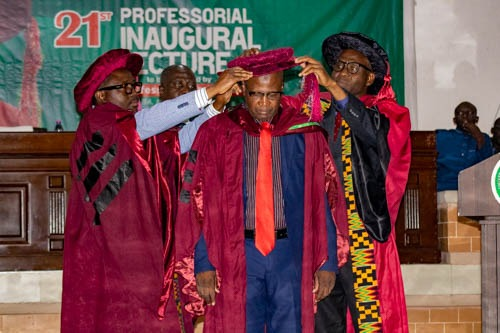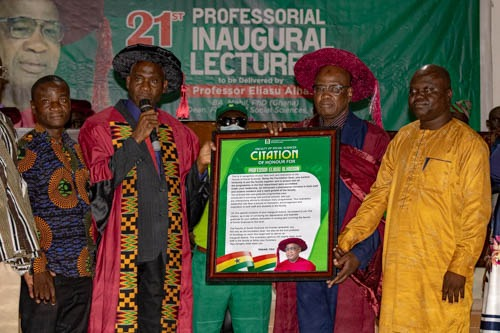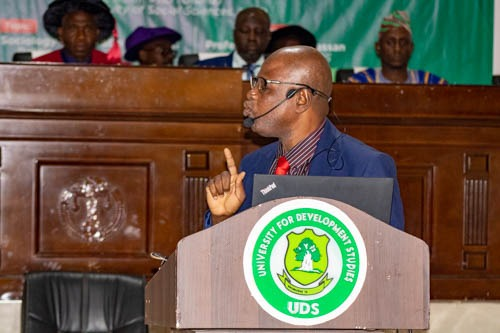
It was an afternoon of intellect, inspiration, and nostalgia at the University for Development Studies (UDS) as Professor Eliasu Alhassan, Dean of the Faculty of Social Sciences, mounted the podium to deliver the institution’s 21st Inaugural Lecture.
By the time he concluded his two-hour address on the intricate links between education, politics, and power, the audience, comprising academics, traditional rulers, security chiefs, students, and even childhood schoolmates, rose in thunderous applause.
The event, held at the Dr Andani Andan Academic Board Chamber, was chaired by the Vice-Chancellor, Prof. Seidu Al-hassan, who used his opening remarks to paint a vivid picture of Prof Alhassan’s academic odyssey.
He traced the speaker’s story from his humble beginnings in primary school through the hurdles of higher learning to his eventual rise through the ranks of academia.
“His journey reflects resilience, brilliance, and determination,” the Vice-Chancellor remarked.
“Today, he stands before us as a professor whose work not only enriches scholarship but also provokes national conversations about education.”

With the stage thus set, Prof Eliasu Alhassan delved into his lecture, “Sociology of Educational Policy: Politics and Power Dilemma,” a presentation that was both scholarly and profoundly relatable. He began with a simple but powerful assertion:
“Educational policy plays a critical role in advancing the future of individuals, institutions, and communities. Yet, its formulation and implementation are rarely straightforward. They are marked by complex power dynamics, politics, and competing values.”
Using history, lived examples, and sharp sociological analysis, he argued that education in Ghana has often mirrored the dominant political ideology of the time, a reality that has influenced everything from curriculum design to classroom pedagogy.
“The influence of politics and power,” he observed, “too often perpetuates social inequalities, gender disparities in school enrolment, rural-urban divides, and unequal access to quality education.”

Prof Alhassan challenged policymakers to move beyond partisan and ideological interests and focus on equity and inclusivity.
“Balancing the need for excellence with equal access demands that we manage the tension between standardized testing and critical thinking, while also accommodating the diverse socio-economic backgrounds of students,” he said.
The professor underscored that real progress in education requires not only sound research but also meaningful dialogue with stakeholders: educators, parents, students, teachers, and community leaders. “Without their voices, no policy can be truly effective,” he insisted.

Throughout his delivery, Prof Alhassan’s blend of academic rigor and heartfelt passion held the audience spellbound. The presence of traditional rulers in regal attire, uniformed officers from security agencies, and former classmates who once shared chalkboards with him decades ago gave the gathering a unique blend of gravitas and warmth.
By the close of the lecture, the consensus among attendees was clear: this was more than an inaugural lecture. It was a national conversation starter.
As one participant whispered while leaving the hall, “It wasn’t just the delivery; it was the depth, the clarity, and the courage to say things as they are.”